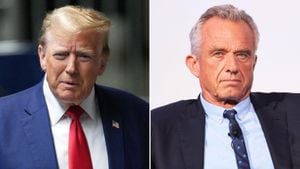Recently, discussions surrounding the Netherlands’ stance on the Ukraine conflict have taken on new dimensions. Ruben Brekelmans, the Dutch Minister of Defense, hinted at the possibility of deploying EU peacekeeping forces to Ukraine, potentially without unanimous agreement from all EU member states. During an interview with Trouw, Brekelmans emphasized how challenging it is for the 27 countries within the EU to reach a consensus on this matter. He stated, "Given the urgency, we might decide not to wait for unanimity." This could allow for smaller groups of countries to move forward effectively without the whole bloc’s agreement.
Brekelmans noted the vastness of Ukraine and the extensive nature of the potential ceasefire line, stating, "If you want to do this reliably, you need many countries and large ones atthat." While he backed the idea of sending peacekeepers, he clarified the Netherlands’ commitment against joining active combat missions. He emphasized, “Participatiing in peacekeeping is different because it’s about maintaining peace.”
At the same time, the discussions have also sparked dialogues among other European leaders. French President Emmanuel Macron had previously convened discussions with partner countries about the possibility of deploying troops to Ukraine, though he recognized the lack of consensus among the nations involved.
On the Italian front, Defense Minister Guido Crosetto has shown willingness to discuss the peacekeeping mission, albeit with emphasis on achieving justice for Ukraine first. Various reports suggest specific European leaders, considering the complexity of the geopolitical situation, are returning to the possibility of sending forces due to concerns about diminished support from the United States, particularly if Donald Trump resumes leadership.
Across the ocean, American outlets reported on potential plans from Trump's advisors for establishing a demilitarized zone along the front lines between Russia and Ukraine. This zone would be monitored by European forces, hinting at discussions of how international frameworks might shape future engagements and responsibilities.
Shifting focus back to domestic affairs, the Netherlands has made it clear they will not engage militarily in Ukraine. Brekelmans reiterated this point, establishing the country’s policies were grounded firmly against military interventions, even when the suggestion of peacekeeping was on the table.
A separate but related discourse came from Dutch Foreign Minister Kaspar Veldkamp, who made headlines when he declared the Netherlands’ intention to block the next cluster of negotiation talks concerning Serbia’s EU membership. Citing Serbia’s insufficient progress on rule-of-law matters and the respect of law concerning relations with Kosovo, he sought to gather EU allies’ support for ramping up pressure on Serbia. He pointed out the need for candidate nations to align their foreign policies with those of the EU, especially as Serbia has neglected implementing sanctions relating to the broader European response to Russia’s aggression against Ukraine.
These multilayered interactions highlight the complexity of the political climate and the fragile nature of international diplomacy underpinning the Ukraine conflict. The involvement of the Netherlands, driven by the urgency articulated by its defense minister, aims to forge strong European negotiations early before they become upstaged by external political forces, such as Trump and Putin.
Notably, the phone call between Turkish Foreign Minister Hakan Fidan and Veldkamp drew attention back to wider geopolitical concerns, including developments in Syria and Gaza. Veldkamp’s conversations emphasized the need for inclusive processes, signaling the interconnectedness of international diplomatic efforts during turbulent times.
Summing it all up, the actions and statements by Dutch officials, particularly against the backdrop of shifting EU alliances and pressures brought about by external leaders, underline the necessary proactive stance the Netherlands must adopt. The push for European-led peace negotiations indicates the sentiment of urgency across the continent, especially against the backdrop of uncertainty surrounding US involvement, driven by the political tides of domestic elections. It's clear the situation demands immediate attention to prevent external influences from undermining well-established partnerships within Europe.



